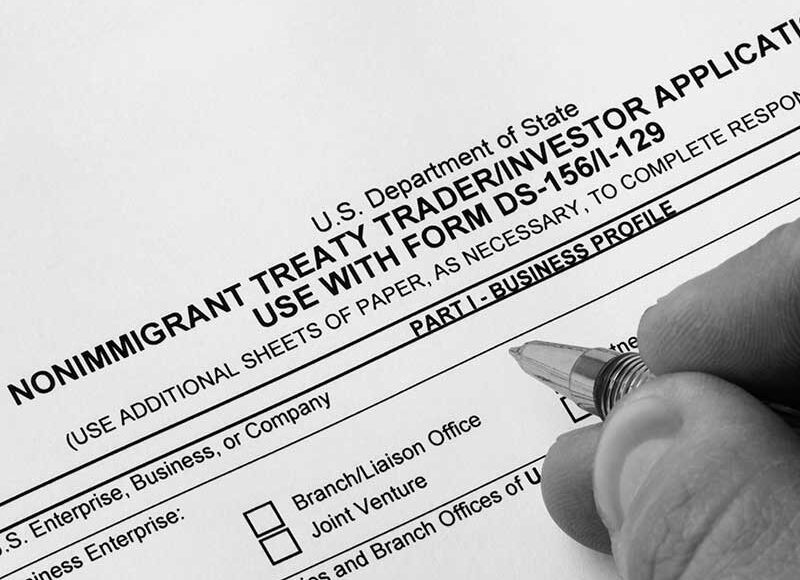Treaty Trader (E-1) and Treaty Investor (E-2) visas are for citizens of countries with which the United States maintains treaties of commerce and navigation. South Korea is one of these countries.
To qualify for Treaty Trader (E-1) and Treaty Investor (E-2) visas applicants must be coming to the United States either to engage in substantial trade, including trade-in service or technology, in qualifying activities, which is principally between the United States and the treaty country, or to develop and direct the operation of an enterprise in which the applicant has invested a substantial amount of capital. Holders of E visas must intend to depart the United States upon the termination of their E status.
The spouse and unmarried children (under 21 years of age) of treaty traders, treaty investors, or employees of enterprises may receive dependent E visas in order to accompany or follow to join their spouse or parent. They are not required to have the same nationality as the principal applicant to obtain an E visa.
E visas permit the investor/trader and his or her family to live in the United States during the period of stay authorized by the Department of Homeland Security (DHS). E visas are nonimmigrant visas; consequently, visa holders are allowed to live in the United States only so long as the conditions under which the visa was granted remain valid. Dependents are not authorized to work in the U.S. unless they receive explicit authorization to do so from DHS-USCIS in the United States. Dependents of treaty traders/investors may apply for work authorization after their arrival in the United States.
General Qualifications for a Treaty Trader
To qualify for an E-1 (Treaty Trader) visa, an alien applicant must meet certain specific requirements, namely:
The alien must be a citizen of a treaty country (refer to our chart on the General Description of E-1/E-2 page for a list of such countries);
The alien must engage in substantial trade with the United States;
The alien must engage in principal trade between the United States and the treaty country which qualified the treaty trader for E-1 classification (trade qualifies as “principal trade” between the U.S. and the treaty country when more than 50% of the total volume of international trade is between the U.S. and the trader’s treaty country.).
Please note that USCIS defines trade as:
“The existing international exchange of items of trade for consideration between the United States and the treaty country.”
This includes, but is not limited to, trade in goods, services, international banking, insurance, tourism, technology and its transfer, and so forth. Generally, trade involves a steady flow of trade items, through numerous transactions over time. The monetary value of transactions is considered, but greater importance is placed on conducting a greater number of transactions, with great overall value.
General Qualifications for the Employee of a Treaty Trader
Employees of 1) an alien holding an E-1 Treaty Trader visa, or a 2) qualifying enterprise or organization may also qualify for an E-1 visa.
To qualify for an E-1 visa as the employee of an individual treaty trader, an alien must meet set specifications:
The alien must be of the same nationality as the alien employer (thus, both being of the nationality of the treaty country);
The alien must meet the legal definition of an employee, i.e. an “individual who provides services or labor for an employer for wages or other remuneration”; and,
The alien must be engaged in executive or supervisory duties, or, if the alien does not meet that requirement they must be employed in a capacity that requires specific qualifications. Specific qualifications are defined by USCIS as specialized skills that make the employee essential to the functioning of the trade. As such, these skills can vary, but often include:
Proven degree of expertise in the specific trade area
Possession of unique skills related to the trade which others do not have
Ability to command a certain salary level based on these skills
An alien can also qualify for an E-1 visa as the employee of a qualifying enterprise or organization. To qualify as such, the organization or enterprise must be at least 50% owned by persons of the nationality of the treaty country who would be coming to the U.S. for trade. Further, those owners must maintain current nonimmigrant treaty trader status, or, if they are outside of the U.S., they must be classifiable as such. To qualify for an E-1 visa as the employee of a qualifying organization or enterprise, the alien must meet the same qualifications detailed above.
Family Members of E-1 Visa Holders
Certain family members of treaty traders and employees may also accompany the E-1 visa holder as dependents. An E-1 visa holder may be accompanied or followed by spouses and unmarried children who are under 21 years of age. Notably, their nationalities do not need to be the same as that of the treaty trader or employee.
E-1 Treaty Trader Visa:
Africa:Ethiopia, Liberia, Togo
Asia:Republic of China (Taiwan), Japan, South Korea, the Philippines, Singapore, and Thailand
Australia:Australia
Central America:Costa Rica, and Honduras
Europe:Austria, Belgium, Bosnia Herzegovina, Croatia, Denmark, Estonia, Finland, France, Germany, Greece, Ireland, Italy, Latvia, Luxembourg, Macedonia, Netherlands, Norway, Poland, Slovenia, Spain, Sweden, Switzerland, and the United Kingdom
The Middle East:Brunei Darussalam; Iran, and Israel, and Jordan, and Oman, and Pakistan, Turkey
North America:Canada, and Mexico
South America:Argentina, Bolivia, Chile, Colombia, Paraguay, and Suriname


